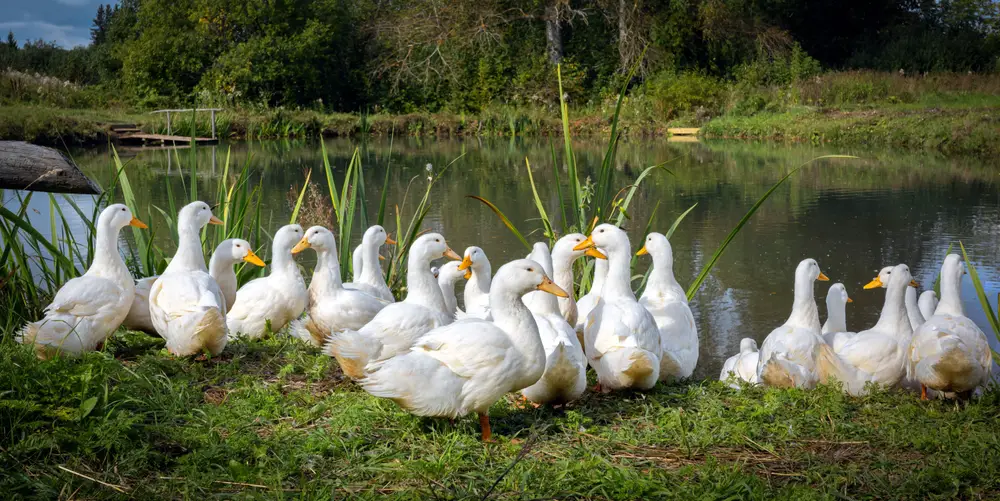If you’ve ever wondered “Do geese eat bugs?” you’re in for a treat! We’ll explore how these magnificent birds serve as effective natural pest control in gardens. While their diet is predominantly grasses and greens, they do love to munch on dragonflies, crickets, and beetles as well as pesky bugs like aphids and mosquitos!
My garden goose, Whiskey, is a beneficial contributor to the farm, she is a natural form of pest control, and I am so lucky to have her! She was raised by hand and is constantly by my side. If you’ve ever had a goose as a part of your homestead you will know right away how majestic and powerful these creatures can be! If you haven’t had a goose on your property but are thinking about it, this article will help persuade you!
Here, we will examine the differences between domestic and wild geese, discuss the diets of domestic geese, explain how to raise loving geese as pets, and discuss the numerous ways Geese are beneficial, such as natural pest control, in a farm setting.
What Is A Goose?
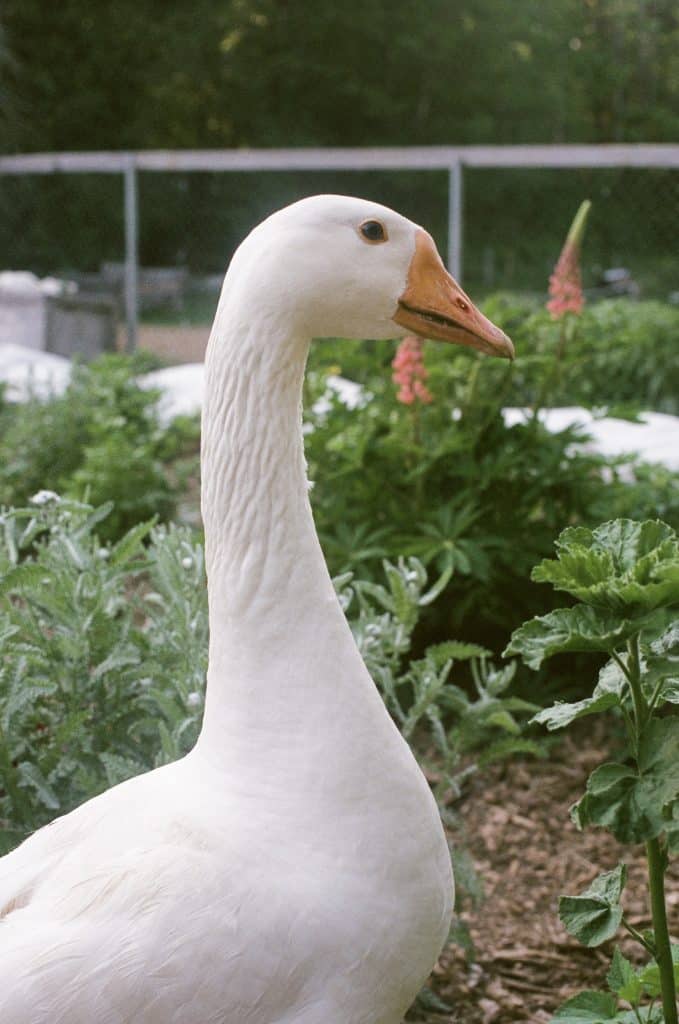
Overview Of Geese As Waterfowl
A goose is a large waterfowl. Waterfowl include all species of:
- Ducks
- Geese
- Swans
Large waterfowl birds are often found near water and require some form of an aquatic environment to thrive. They are found on every continent in the world (except Antarctica!). They are adaptable, travel far distances when migrating and, in my opinion, are very cute!
Differences Between Wild And Domestic Geese
Geese were domesticated 3,000-11,000 years ago, during the Neolithic period. Domesticated geese originated from Eurasian geese, the greylag, and swans. There are a couple of differences between domestic and wild geese including size and plumage colourings. Below you will find some main differences between the two:
Wild Geese
- Wild geese migrate
- Wild geese are herbivores
- Live a monogamous existence, meaning they will remain with the same partner for their lifetime
- Wild geese can fly
Domesticated geese
- Domestic geese do not migrate
- Domestic geese are omnivores
- Domestic geese are generally bigger than wild geese
- Domestic geese live a polygamous existence, meaning they will have more than one mate in a breeding season
- Domestic geese cannot fly, or can only fly very short distances
Do Geese Eat Bugs? Understanding Their Diets
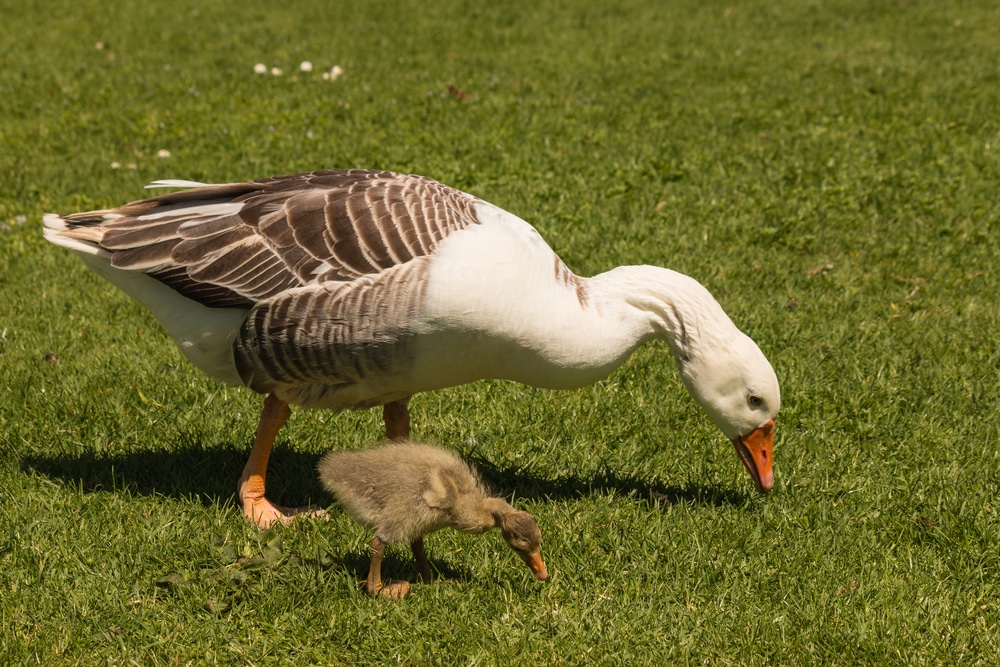
In this section, we’ll dive deeper into the question, do geese eat bugs? You might be surprised by the variety of insects they consume!
Geese are omnivores with opportunistic feeding tendencies. This means they are adaptable and will eat a wide range of plants and insects. A goose’s habitat determines their main source of sustenance. While greens make up a significant portion of their diet, the insects they consume, such as dragonflies and aphids, play a crucial role in their effectiveness as natural pest control in gardens.
Let’s explore the specific diet of a domestic goose.
| Plant Diet | Insect & Bugs |
|---|---|
| Clover | Aquatic Insects |
| Alfalfa | Terrestrial invertebrates |
| Grass | Dragonflies |
| Duckweed | Beetles |
| Algae | Caterpillars |
| Roots, Shoots, Stems | Crickets |
| Seeds | Grasshoppers |
| Leaves | Mosquitos |
| Grain | Aphids |
| Berries | Worms |
Seasonal Diet Changes: What Do Geese Eat Throughout The Year?
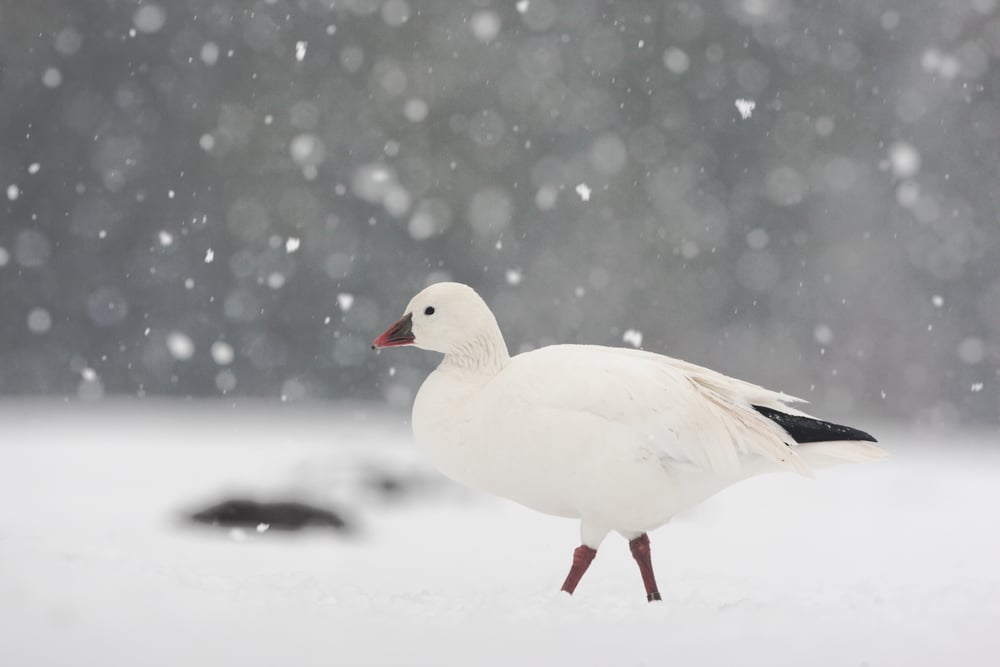
Seasonal diet variation is common within geese. Throughout the seasons, the answer to do geese eat bugs changes. In summer, their diet is rich in insects, making them valuable for gardeners looking for natural pest control. Likewise, from spring to fall there is a wide range of available food, whereas the winter sees a decline in variety. This seasonal variation is important for gardeners to understand for effective pest control.
Spring
In the spring, geese take advantage of the emerging insect populations and new vegetation. A great time to use them as natural bug mitigation in your garden but keep them away from your veggie seedlings!
Summer
Geese are perfect for pest control in the garden at this time. They take advantage of the peak of the bug population, consuming dragonflies, beetles, aphids, and anything else they can get their beaks on! In the summer, they eat both insects and greens, with greens such as grass and plant matter encompassing about 90% of their diet. They also eat berries during this season.
Fall
In the fall, they continue to consume what insects and critters are still scuttling about. They will also eat plant matter and berries for as long as they are available.
Winter
In the winter, as the bugs die off, they are more reliant on grain feed. This is especially true in areas where there is snow. The feed can consist of oats, wheat and corn. It is best to buy feed from your local farm store. They will have the right ratios required to sustain healthy geese.
How Much Do Geese Eat?
Geese are big eaters! The daily food intake of a goose is up to four pounds. But they also poop up to 3 pounds a day as well!
How Geese Act As Natural Pest Control In Your Garden
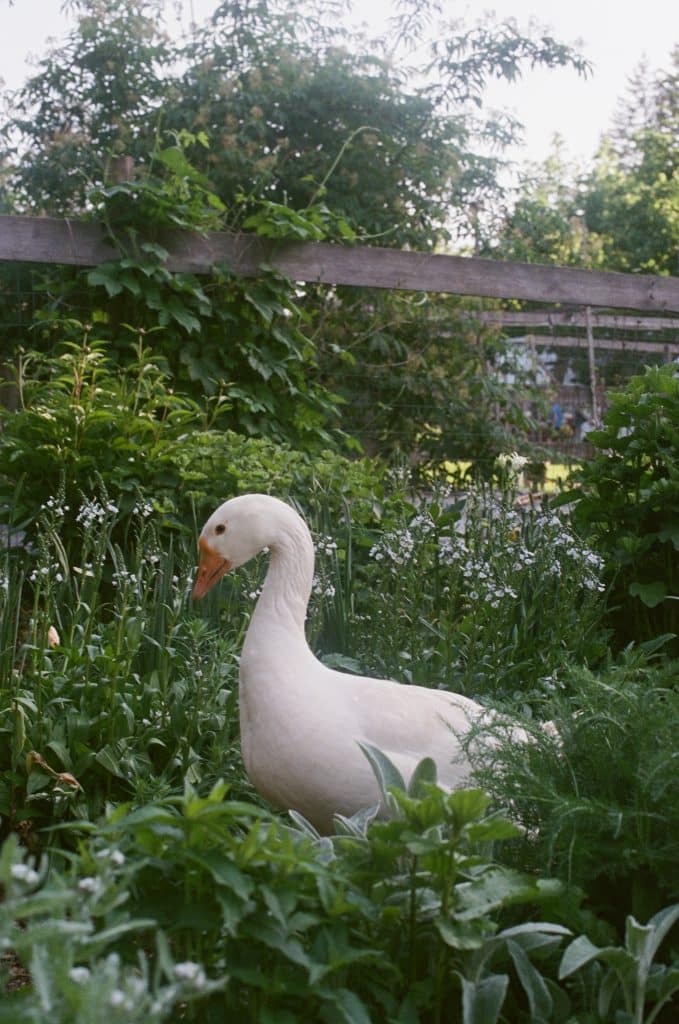
My garden goose, Whiskey, not only provides companionship but is also a valuable partner in helping regulate the insect population in my garden.
Geese As Natural Pest Control For Gardeners
Incorporating geese into your garden can provide an effective method of pest control. So, do geese eat bugs? Absolutely, and this can benefit your garden significantly. Geese are a form of biological mitigation. They eat unwanted insects that may be detrimental to agricultural crops, such as:
- Grasshoppers
- Beetles
- Aphids
- Ticks
They work to control the population of these insects, helping to create balance in a healthy environment. The impact of a goose’s daily diet on garden ecosystems is a beneficial one. They help to regulate insect populations and they keep weeds and grass down to a manageable length. They are great lawn mowers! This helps to deter insects like ticks, who generally favor tall grass.
Geese And Regenerative Agriculture: Benefits For Gardeners
Geese are beneficial gardeners helpers! They aid in a positive homesteading experience for many reasons. Geese contribute to regenerative agriculture through biological pest control, natural grazing, and fertilization.
Regenerative agriculture aims to keep a balance in the natural ecosystem. Its focus is using organic, sustainable growing methods to increase soil conditions, reduce carbon dioxide (CO2) emissions, and work as closely with the natural cycle of life as possible.
Natural Fertilization
Geese not only help control pests but also enhance soil health by naturally fertilizing the ground with their droppings. Their poop makes excellent garden fertilizer. As they forage for bugs and grasses throughout the garden, they will poop! You can then add this poop to your compost to help create healthy soils.
In addition, as they forage, scratch, and kick they aerate the ground and encourage microbial activity which promotes healthy plant growth.
It’s important to note that Geese actually poop a lot! Geese can poop up to three pounds daily! They do better in an open area so as to not overwhelm the garden with the amount of poop they produce. Their poop can burn plants if too much is dropped right into the garden space.
Garden Protectors
Geese also help to protect other livestock like chickens or ducks. They help to deter birds of prey on the farm. They are territorial and love to protect the homestead. They call loudly and are a great warning system as they will alert you when danger is near. They are perfect guard dogs geese!
Geese As Pets: Can Geese Benefit Your Garden And Home?
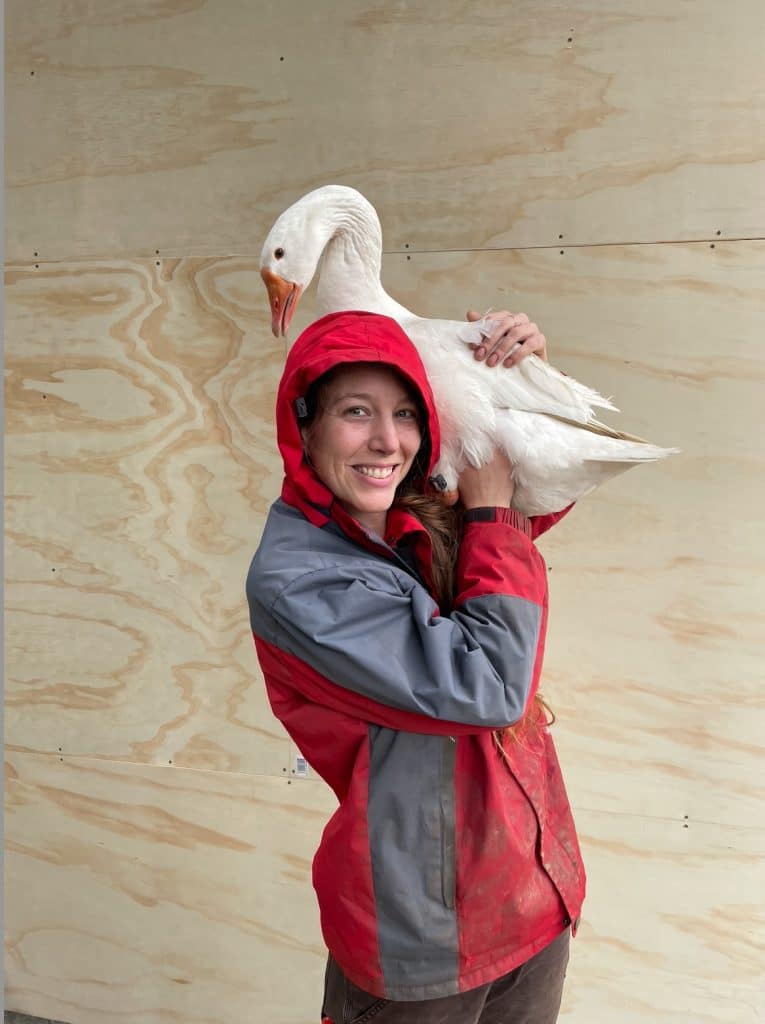
For those looking to enhance their gardens, introducing geese can be a game-changer. Understanding do geese eat bugs will help you strategize their placement in your pest control efforts.
Tips For Gardeners
When planning your garden, consider how geese pest control in gardens can lead to a more balanced ecosystem and reduced reliance on chemical pesticides.
The biggest tip for gardeners is to do your research on goose varieties! Determine what role you want the goose to play within your homestead. Decide whether your geese will be used for meat or egg production, protection, or as a pet! From there you can determine what breed of goose is best suited for your homestead and family.
Make sure you have fenced-off areas on your property. Geese will tour all over and sometimes it’s nice to be able to keep them off of your front lawn! This also comes in handy if you have a very territorial goose. Managing where they are able to go on the property is to your advantage.
If you are looking to raise a goose as a friendly pet, my recommendation would be to rent or buy an incubator and hand-raise from a hatchling. They tend to imprint early. By being with your goose from day one, you can train them to be friendly and loving, especially around children.
Have your children hold the gosling daily! This is a wonderful way to incorporate children into homesteading activities and educate them on where their food comes from, the circle of life, and the importance of respecting and treating animals kindly.
The Temperament Of Domestic Geese As Pets
If raised by hand from a hatchling, geese as pets can be sweet and loving. They are inquisitive, smart, and love being around their people. They make wonderful companions, will greet you at the garden gate, and follow you around the entire time you are out on the property. They will even give you hugs!
There are certain varieties of geese that have a calmer demeanor and are considered kinder and sweeter. Sebastopol geese are one of these breeds. They have unique curly feathers and are smaller than some other varieties of geese. If you are looking to raise geese specifically as a pet, this breed is one to consider.
How Geese Raised By Hand Can Bond With Humans And Contribute Positively To Home Gardens
My garden goose sincerely helps with my mental health. They keep my mind at ease because I know my chickens and ducks are safe when they are together. I love spending time in the garden with my garden goose. By raising your goose from hatchling, you create a bond that is so strong.
Geese that are not raised by hand can be aggressive. As they are protectors of the homestead, geese who have not had a lot of one-on-one time with humans can be brash, even charging people who come close to them!
If you are looking for a calm garden goose, my recommendation is to hand-raise the goose from hatchling. Working with them everyday will help the goose to get comfortable with you.
Geese As Protectors And Companions For Other Animals
Geese create such a wonderful bond with the other farm animals. They spend a lot of time hanging around the chickens and integrating with other animals on the farm. Geese also love their own kind. It is best to have at least 2 geese so they can flock together.
Raising Geese For Meat
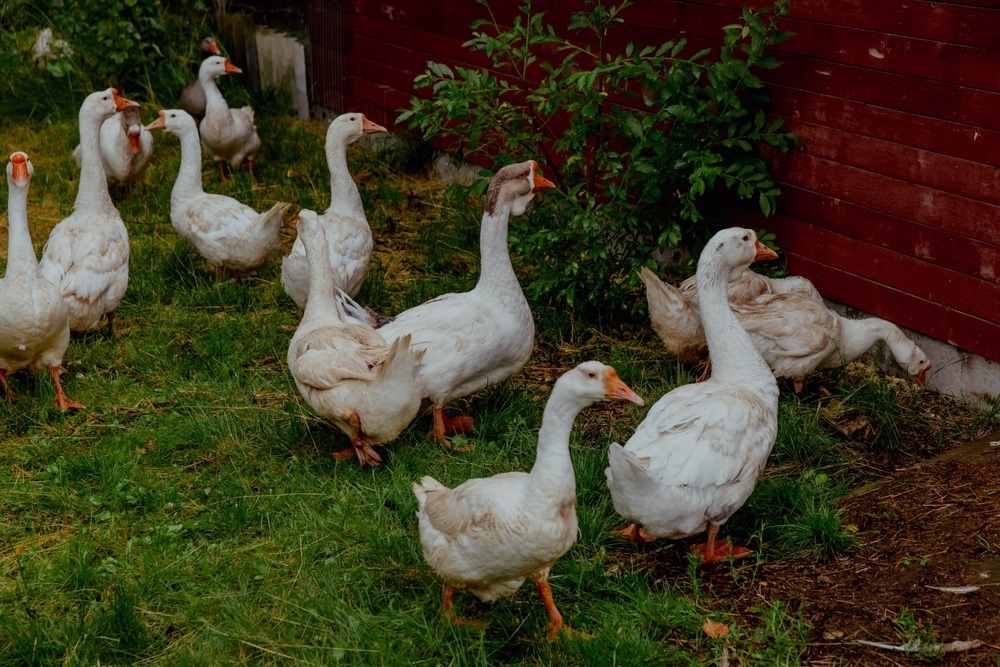
Raising geese for meat is another way to live sustainably and grow your own food. Toulouse is one of the best varieties to raise for meat. Geese also provide eggs, which are an added protein benefit.
How Raising Geese For Meat Can Be An Additional Benefit For Homesteads And Farms
By providing eggs and a substantial amount of meat, geese are a wonderful added benefit to any homestead. They are low maintenance and relatively inexpensive to care for. Their grazing abilities help to keep lawn grass low, and they help to keep insect populations at bay. Their down feathers can be used as stuffing material in duvets, pillows, and coats.
Their Territorial Nature And How It Helps Protect Other Animals And From Predators.
Geese, in general, are territorial by nature. This quality helps to protect farm animals by deterring predators from nearing the homestead. They are loud and will charge at anything that deem to be suspicious. Their call is often used as an alarm bell, to warn other animals that danger is near. Geese will physically attack predators if they come too close. They use their wings and beaks as a defense mechanism.
There are some varieties of geese that are more defensive than others. African geese or Chinese geese are thought to be more aggressive varieties.
Why Geese Are The Perfect Garden Helpers
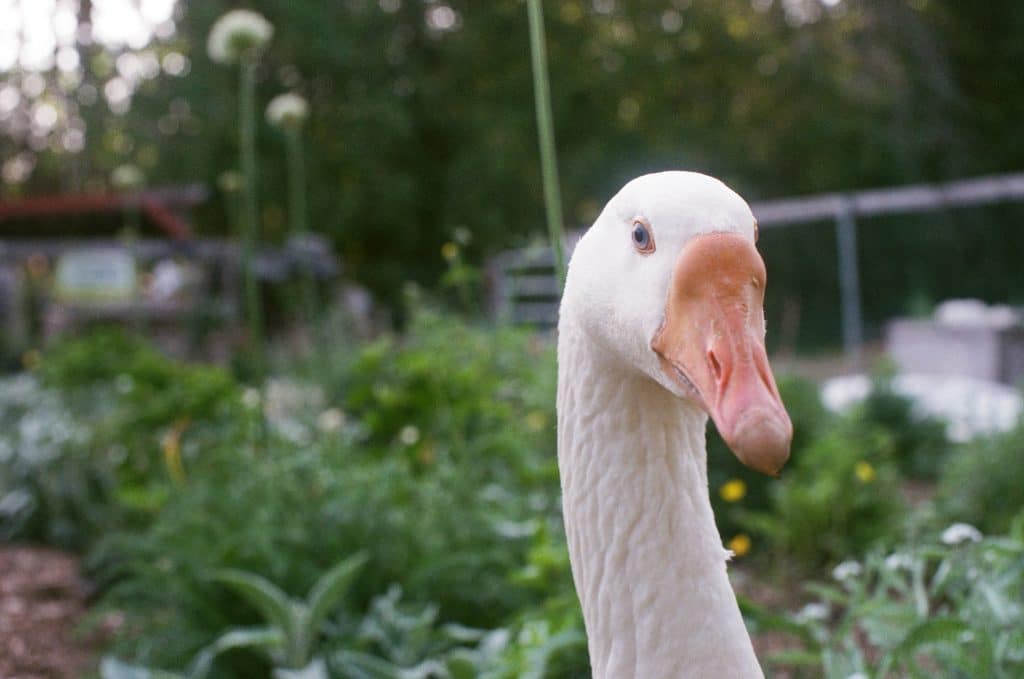
There are so many benefits to having geese in the garden. They contribute to a sustainable garden ecosystem, providing both pest control and lawn maintenance. They make wonderful farm pets and are an added protection measure to the homestead. I hope you found this article interesting and are able to take away valuable information! Having a garden goose was one of the best homesteading decisions I ever made!
In conclusion, knowing the answer to ‘Do geese eat bugs?’ is essential for any gardener. By using geese as natural pest control, you can significantly reduce the need for chemical pesticides, creating a healthier garden ecosystem.

